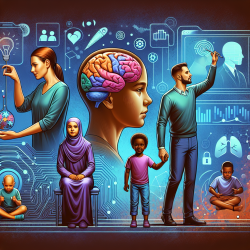The study "Evaluation of emotional and psycholinguistic problems in deaf and hard-of-hearing students in the Canary Islands" offers valuable insights for practitioners working with deaf and hard-of-hearing (DHH) students. This research underscores the importance of understanding the unique emotional and psycholinguistic challenges faced by these students, which can significantly impact their academic and social development.
Key Findings and Implications for Practice
The research highlights several critical outcomes that practitioners can leverage to enhance their skills and improve outcomes for DHH students:
- Conduct Problems and Emotional Health: The study found that conduct problems were the SDQ subscale that most distinguished children with cochlear implants (CIs) from those with hearing aids (HAs). Practitioners should be vigilant in monitoring and addressing conduct issues, particularly in students with CIs.
- Teacher and Specialist Influence: The experience of tutors and specialist teachers significantly influenced students' psycholinguistic abilities. This finding emphasizes the need for ongoing professional development and collaboration among educators to support DHH students effectively.
- Psycholinguistic Abilities: The Illinois Test of Psycholinguistic Abilities (ITPA) results varied based on several covariates, including the type of hearing device and the educational environment. Practitioners should consider these factors when developing individualized education plans (IEPs) and interventions.
Actionable Steps for Practitioners
To implement the findings from this research, practitioners can take the following steps:
- Conduct Comprehensive Assessments: Use tools like the Strengths and Difficulties Questionnaire (SDQ) and the ITPA to evaluate the emotional and psycholinguistic abilities of DHH students. These assessments can provide a holistic understanding of each student's needs.
- Foster Collaboration: Encourage collaboration between general education teachers, specialist teachers, and speech-language pathologists. Sharing expertise and strategies can lead to more effective support for DHH students.
- Professional Development: Invest in ongoing training for educators and specialists to stay updated on best practices for supporting DHH students. This includes understanding the impact of different hearing devices and adapting teaching methods accordingly.
- Individualized Support: Develop tailored interventions that address the specific emotional and psycholinguistic needs of each student. This personalized approach can help mitigate conduct problems and enhance language development.
Encouraging Further Research
While this study provides valuable insights, there is still much to learn about the best practices for supporting DHH students. Practitioners are encouraged to engage in further research and contribute to the growing body of knowledge in this field. Areas for future research include:
- Longitudinal studies to track the long-term impact of different interventions on DHH students' emotional and psycholinguistic development.
- Comparative studies to evaluate the effectiveness of various educational settings and teaching strategies for DHH students.
- Research on the role of family involvement and home environment in supporting the emotional and academic growth of DHH students.
By staying informed and proactive, practitioners can make data-driven decisions that lead to better outcomes for DHH students.
To read the original research paper, please follow this link: Evaluation of emotional and psycholinguistic problems in deaf and hard-of-hearing students in the Canary Islands.










